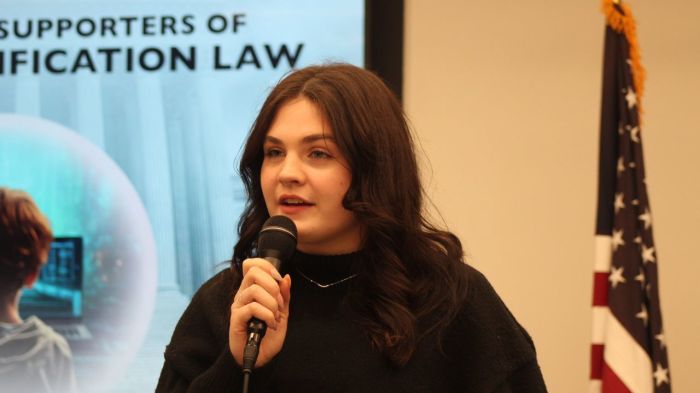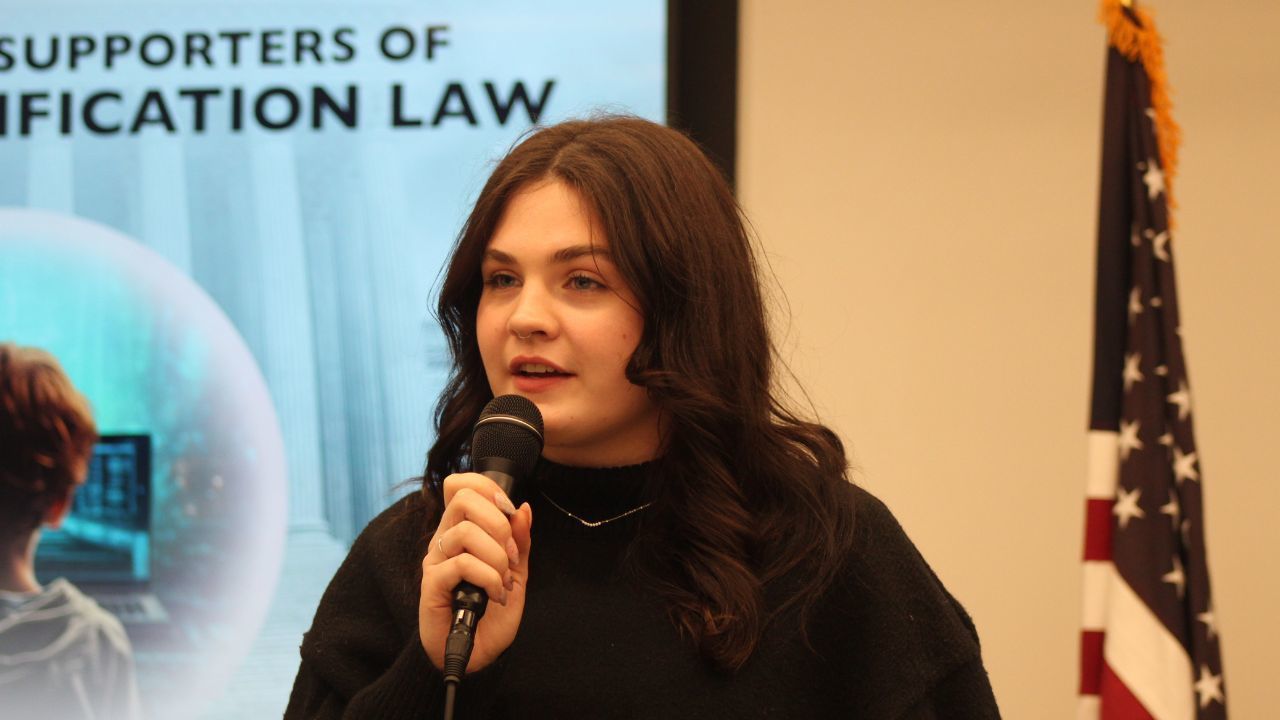
Editor’s note: This article contains descriptions of sexual abuse, exploitation and references to suicidal thoughts and self-harm that some readers may find disturbing.
WASHINGTON — A young woman exposed to pornography at a tender age recalls looking in the mirror after being sexually assaulted to see bruises all over the inside of her mouth. At the time, she felt conflicted about what happened because porn conditioned her to believe that consent was irrelevant.
Rachel Robison, a pornography exposure abuse survivor, joined several supporters for a briefing last week held at the National Center on Sexual Exploitation headquarters, saying that if porn sites had been required to verify the ages of their users, she may have been saved from a decade-plus pornography addiction.
Robison, who is now happily married to the love of her life, said she was exposed to porn at 7 years old during a play date, leading to a 13-year-long battle with a pornography addiction.
As a result of the pornographic content she was exposed to as a minor, the young woman said she struggled with a distorted view of sex and various mental health issues.
“There is no place for children in the porn industry,” Robison told event attendees. “If these sites would have had age verification, then my life would have looked extremely different, and I would not have endured the pain and suffering that I did growing up.”
“I should have never had the access that I did to porn,” she contends.
Last Tuesday’s event centered around House Bill 1181, an age verification law in Texas that went before the U.S. Supreme Court last week. Pornography websites such as Pornhub have repeatedly faced accusations and lawsuits for failing to protect minors, including allegations of profiting from child sex abuse material.
Under House Bill 1181, any website with more than a third of “sexual material harmful to minors” must implement age verification measures. After the law was passed in 2023, pornography distributors challenged it, claiming that a law requiring them to verify age violated the First Amendment and user privacy rights.
That same year, Texas Attorney General Ken Paxton secured a victory for House Bill 1181 in the U.S. 5th Circuit Court of Appeals, which stayed a district court’s injunction against the law. The appeals court ruled that the state attorney general’s office could enforce the law while litigation continues.
After she easily accessed porn at the age of 7, Robison said she eventually found and watched pornographic videos depicting abuse. To illustrate the type of content she had access to, the advocate listed titles of videos on Pornhub, such as “Little Girl Tied Up For the First Time” and “Woman Raped: She’s Not Allowed to Say No.”
“The porn industry taught me that I was an object,” the advocate said. “That being hit, degraded and used is not only normal but a turn-on in my place as a woman in the world. And if I did not consent, then that is OK because I am just an object of pleasure.”
By age 8, Robinson said she began to feel as if something was “deeply wrong” with her. As she grew older, she realized that what she felt was shame.
By the time she was 11, Robison started hurting herself on purpose and eventually had to be hospitalized after a suicide attempt and what she described as “extreme self-harm.”
She went to multiple therapy sessions, and during each appointment, the counselor would ask Robison why she wanted to hurt herself.
“I felt way too much shame to admit that I had a porn addiction, so I always responded with, ‘I don’t know, I just want to die,'” she recalled. “But it was porn. Porn caused me to hate my body, question my worth, isolate myself from others and consume violent graphic content until I often felt sick to my stomach.”
In her preteens, Robison was diagnosed with anxiety and depression. She also struggled with an eating disorder starting from the age of 12 and lasting until she was 20.
“The mental health issues I was facing were rooted directly in my pornography addiction,” she explained. “Porn stole my innocence and polluted my mind, creating a dark reality that almost took my life.”
After being sexually assaulted at age 16, Robison looked at herself in the mirror and thought, “This is just like porn.” She cried and asked her assailant to stop, but she remembered feeling conflicted, as watching pornography conditioned her to believe she was supposed to enjoy experiences like the one she endured.
“This mindset was brought on by porn and had desensitized me to abuse and sexual violence,” she said. “And it was this mindset that told me to stay in my relationship with my abuser because my no can actually never mean no.”
“This is what the porn industry teaches us,” she stressed. “That I am an object. That my opinions have no real meaning.”
It wasn’t until she started attending college at the age of 18, where she took mandatory Title IX training, that Robison realized she was being abused. While the advocate says she still suffers from nightmares and hypersensitivity to sexual content, Robison told attendees she is now “10 years clean from self-harm” and “four years sober from porn.”
“Porn preys on the minds of children and young people with no attempt to protect them, but rather to make a profit despite their innocence,” Robison said. “And I stand here today on the right side of history, choosing to fight for age verification on porn sites for my younger self and the children of the upcoming generation.”
Samantha Kamman is a reporter for The Christian Post. She can be reached at: samantha.kamman@christianpost.com. Follow her on Twitter: @Samantha_Kamman








